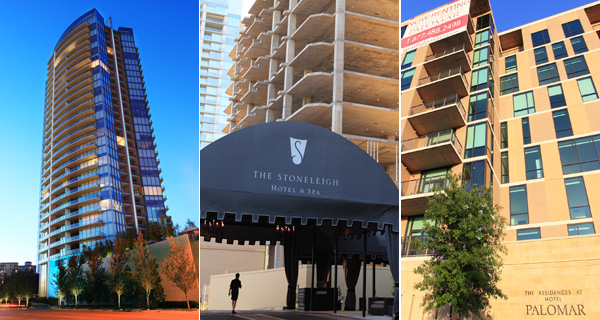Remember how exciting Dallas real estate was just a couple of years ago?
Driving along Stemmons Freeway and looking east, you couldn’t help being amazed by the number of cranes swinging above Uptown. The Dallas skyline, once confined to that swath of land surrounded by Woodall Rodgers Freeway and Interstates 35, 30, and 45, seemed to be on a northward march. There were too many new high-rise projects to count, most of them luxury condominium developments: One Arts Plaza, Azure, the Victory developments, the Ritz Carlton, 1900 McKinney, just to name a few.
What a difference two years makes.
If the financial crisis has you worried about the value of your home—with the rising number of foreclosures at all price points, the sinking volume of home sales, and buyers who expect home prices to have dropped ridiculously low—be glad if you didn’t buy into Dallas’ condominium building boom. Because if there’s one segment of the real estate market that has been hit harder than any other in the financial downturn, it’s the residential condo.
Nationally, sales prices of existing homes fell 16.8 percent from May 2008 to May 2009, according to the National Association of Realtors. Condos performed even worse, with prices dropping 21.9 percent during the same period. The volume of condo sales was also down during the period, falling nearly 9 percent, compared to a 3 percent drop for single-home sales.
Locally, the home-sales numbers were slightly worse.
Dallas pre-owned, single-family home sales fell 24 percent between May 2008 and May 2009, while local condo sales sank 33 percent, Texas A&M University’s Real Estate Center and North Texas Real Estate Information Systems Inc. reported in June.
Part of the problem is that there were just too many condos built in the years leading up to the financial meltdown. However, if Dallas looked like it was experiencing an inner-city building boom during the mid-2000s, cities like Miami, Phoenix, and Las Vegas blew us out of the water.
The crisis has hit those cities much harder. In Miami, some lenders have gone so far as to blacklist entire condo buildings, refusing to originate mortgages for any units in a building seen to be “too risky.” In fact, compared to some of these other cities, Dallas’ condo market is faring comparatively well, says Cassie Gibson with Residential Strategies Inc., a Dallas-based residential real estate consultancy.
Volume is down in the condo market—and so are prices—but, despite the new condo product that has come on line in recent years, the quantity of Dallas’s new building does not compare with places like Miami, Phoenix, or even Austin, where the condo crunch is much more severe.
“Dallas has a relatively small in-town condo market, even compared with Austin,” Gibson says. “Austin draws a lot of second-home buyers, and the city was pushing to see more downtown development.”
One of the reasons Dallas dodged the brunt of the storm is that many of the condo developments in other parts of the country were banking on boom-boosted buyers from other markets speculating in hot-spot cities like Vegas and Miami, Gibson says. The fact that Dallas isn’t exactly known as a hip travel destination may have helped ward off even more development speculation in the local market.
Buyer’s Market
This is not to say that everything is rosy in the Dallas condo market. It all depends on where you look. Some sectors of the market are getting hit harder than others, says Lewis McKnight, a Realtor who has sold units in some of the Victory Park developments.
“If you have a regular unit $400,000 and below, it sells well,” McKnight says. “Above that, Dallas can’t support [it].”
The main reasons for the condo slowdown here are two-fold. One is the simple fact that there are fewer buyers in the market today. The other is the credit crunch.
“When you buy a single-family house, you have the house and the land. But with a condo all you have are four walls, and there is a lot more risk,” McKnight says.
There are two kinds of luxury products on the ground in the Dallas condo market, McKnight says. Condos in the $400,000 to $800,000 range are in an especially bad way just now because those products require jumbo loans. A jumbo brings its own set of rules and requirements for borrowers, and it’s particularly difficult to qualify for these days.
Ironically, super-luxury condos—those north of $800,000—are selling more easily in today’s market, says Judy Pittman, a Realtor specializing in Uptown / Turtle Creek. The reason: buyers at that level usually have more financial flexibility and independence.
“It is definitely a buyer’s market, but it is not a desperate market,” says Pittman, who says she’s closed north of $15 million in transactions this year through June. “It has been really difficult to get financing. Lenders are requiring two or three appraisals. Lenders have gone from being extra loose to being extremely tight.”
As a result, Pittman says, the success of a condo development rests on the kind of buyer developments cater to.
One of the highest-profile condo developments in Dallas is Uptown’s Azure tower, which offers units starting at $400,000 and ranging to $1 million-plus. At these price points, the Azure is essentially catering to two buyer profiles: the urban professional who needs to qualify for a jumbo mortgage to purchase, and a more financially independent buyer.
The Azure has been able to sell units, but it is not in danger of selling out. There are currently 19 units at the Azure still on the market, indicating that the building is between 60 and 70 percent sold, according to the real estate listing service MLS. Eleven of these units are listed at prices of $700,000 or more.
Mortgage credit problems have been compounded in the condo market. In March, Fannie Mae said it would no longer guarantee mortgages on condos in buildings where fewer than 70 percent of the units have sold, up from 51 percent of the units previously. In addition, if 15 percent of the owners in a particular building are delinquent paying their home owners association dues, or if more than 10 percent of the units are owned by a single buyer, Fannie Mae considers the building in financial trouble and will restrict its lending.
Lending restrictions have also crimped developments that were under way before the crisis hit. Many condo projects need a certain percentage of presales in order to qualify for construction and other development loans. Some developments, like the Stoneleigh Residences behind the historic Stoneleigh Hotel, have been halted mid-way through construction due to bankruptcy.
Plummeting sales and the tightened mortgage market have forced developers to offer more incentives to buyers, such as picking up HOA fees, cutting prices, or offering in-house financing. As the original buyers look for a way out of their investment, some developers find themselves competing with sellers who purchased units at pre-construction prices.
A number of condo developers have made a transition from selling units to leasing them. Consider, for example, the Residences at the Hotel Palomar, which opened in 2006 directly adjacent to the refurbished Hotel Palomar. With its five-star Exhale Spa, the Palomar was a poster child for the new luxury-condo boom. But when sales lagged, the developers decided finally to switch from selling units to leasing them out.
Philip Brosseau, a developer of the Palomar, says that within two weeks of making the switch, 17 previously unoccupied units of the building were leased. Seven additional units have since been leased, Brosseau says.
A representative for the Azure says that building is not leasing units directly, though some of the property owners are leasing out their units independently.
Leasing is a viable option for developers looking to fill up empty condo towers. But it’s also an option developers want to resist until they have few other choices, says Gibson of Residential Strategies. “A renter has a different mindset than a homeowner, and there is also the question of HOA dues.”
While a builder may be able to recoup some cash through leasing a unit, it is difficult to command a rental rate that covers the HOA fees used to maintain the building had the unit been sold instead. “It is different for each building, but if you are living in a building that is partially sold, the developer is keeping up the HOA fees for the non-sold units,” Gibson says.
It makes for an uneasy situation for the condo owner, who not only faces the possibility of lower home values due to leasing, but a strapped developer dealing with unexpected overhead. And, if the bottom falls further, the situation can quickly get uglier. “If the developer goes into default … certainly there is room for lawsuits,” Gibson says.
Simek is a freelance writer in Dallas. His last article for D CEO, in the May/June issue, was about the dire outlook for commercial real estate in general in North Texas.





